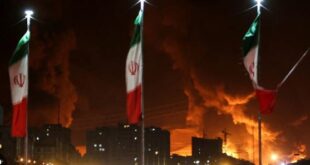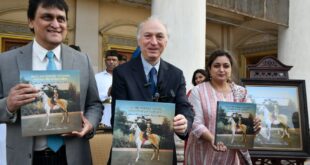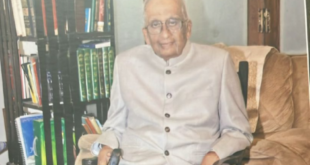By: Asad Mirza
The United States signed a peace deal with the Taliban, of Afghanistan on 29 February at Doha, Qatar. The accord follows a weeklong truce and 18 months of stop-and-go negotiations. It sets the terms for the withdrawal of the remaining roughly 13,000 U.S. troops from Afghanistan over next 14 months. In exchange, the Taliban must enter talks with Afghan government officials and cut ties with terrorist groups like al-Qaida.
But peace in Afghanistan will take more than an accord to finally happen. Various internal and regional factors will weigh upon the Taliban to take the final plunge, likewise the US and regional players’ response in the interim will also determine the final outcome.
The regional and international players responded cautiously to the accord. Pakistani officials and experts welcomed the peace deal, but some expressed caution over the future peace process of Afghanistan. India, on its part said its consistent policy has been to support all opportunities that can bring peace, security and stability in Afghanistan and ensure end of terrorism. MEA’s spokesperson said India would continue to extend all support to the Afghanistan as a contiguous neighbour, in a clear reference that the Pakistan-occupied-Kashmir belongs to India.
UN Secretary-General Antonio Guterres called the agreement an important development in achieving a lasting political settlement in Afghanistan, while stressing the importance of sustaining a nationwide reduction in violence. Saudi Arabia’s foreign ministry said it hoped the agreement would lead to a comprehensive and permanent ceasefire and nationwide peace in Afghanistan. Meanwhile, NATO Secretary-General Jens Stoltenberg heralded the agreement as a ‘first step to lasting peace’. Mullah Abdul Ghani Baradar, head of the Taliban political office in Qatar, said that the group was ‘committed to implementing this agreement’. In a televised speech, US President Donald Trump hailed the deal and said he would personally meet Taliban leaders ‘in the not too distant future’. Speaking at a news conference in the White House, Trump said Afghanistan’s neighbours should help maintain stability following the agreement.
Three successive American presidents had promised victory in Afghanistan, even if they each defined it differently. President George W. Bush began the Afghan war to hunt down Osama Bin Laden in the months after the Sept. 11, 2001, WTC collapse. Yet he soon turned his attention to Iraq and, despite denials by the White House, used resources from the Afghan effort to fuel his next war in Iraq. President Barack Obama called Iraq a strategic mistake, but pledged that America would not lose the ‘good war’ in Afghanistan. Yet his strategy failed to strike a decisive blow.
The deal on the table in Afghanistan is the culmination of peace talks that began in September 2018, with Zalmay Khalilzad, the U.S. special representative for Afghan reconciliation, opening a dialogue with the Taliban Political Commission. The US administration initiated bilateral talks that excluded the government of President Ashraf. In January 2019, Khalilzad offered to give the Taliban a timeline for the withdrawal of U.S. military forces. In return, the Taliban eventually agreed to stop assisting Al Qaeda and other terrorist groups, to reduce violence, and to reach a political settlement with the government and other Afghans that would end the war.
The first snag has already come in the form of Afghan President Ashraf Ghani saying his government was not committed to the release of 5,000 insurgent prisoners. This demand was one of the key components of the Doha Accord. As per the deal up to 5,000 Taliban prisoners should be released by 10 March in order to facilitate the intra-Afghan negotiations.
Besides this, the intra-Afghan talks are another sensitive issue involving squabbling Afghan factions and rival Taliban. These talks will be much more intricate and demanding besides trying to evolve a consensus on many sensitive pride issues. There should be a resolve to take further steps down the path to peace, even as the Taliban are trusted and tested. The US can change course if the Taliban prove insincere. In the best scenario, the Taliban would break from Al Qaeda and agree to a political settlement in which they may refrain from demanding a monopoly rule and may accept democratic elections, women’s rights, and full-fledged political rights for all Afghans, all of which seems too far fetched, given Taliban’s zealous commitment to these issues.
In another scenario, the Taliban might pick up arms again and try to control the country once U.S. military forces complete their withdrawal. Such a betrayal is by no means predictable, but the possibility cannot be eliminated. The United States should also make it clear that if the Taliban defaulted on the deal, U.S. military action would overturn their regime once more. A joint initiative involving Pakistan, Russia, and other regional powers that pledge their opposition to the breaking of a political settlement and a return to Taliban rule could be particularly helpful. Moreover, Pakistan, with its concerns about possible Indian influence in Afghanistan, could pressure the Taliban to resist any settlement that doesn’t accord with Pakistani interests.
In the near term, the United States should explore the opportunities that peace talks offer. It should be patient and let this process play out, extending the withdrawal timeline and pressuring the Afghan government and the Taliban as necessary and as per the situation and demands.
Asad Mirza
Asad Mirza is a Sr journalist based in New Delhi.
In his career spanning more than 20 years, he was also associated with BBC Urdu Service and Khaleej Times of Dubai.
He writes on Muslims, educational and international affairs issues.
Email: asad.mirza.nd@gmail.com
 Gawah (The Witness) – Hyderabad India Fearless By Birth, Pristine by Choice – First National Urdu Weekly From South India – Latest News, Breaking News, Special Stories, Interviews, Islamic, World, India, National News
Gawah (The Witness) – Hyderabad India Fearless By Birth, Pristine by Choice – First National Urdu Weekly From South India – Latest News, Breaking News, Special Stories, Interviews, Islamic, World, India, National News






